
Transaction accounts can open up access to those currently left out of the banking system, providing a basic entry point, or pathway, to broader financial inclusion.
Using transaction accounts to move away from cash to digital payments has made it easier to be part of the formal financial system, even when brick-and-mortar banks are too far away or prefer not to serve poor people.
A transaction account used to only mean an account at a bank. Nowadays, a transaction account could be a bank account, a mobile wallet, payment card, or a similar electronic instrument.
A lot has happened in the five years since the G20 meeting where the international community recognized financial inclusion as a main pillar of the global development agenda. Since then, more than 50 countries have made formal commitments or set targets for financial inclusion.
But much work remains. Worldwide, 2.5 billion adults still lack access to basic financial services. Closing this gap is vital to ending extreme poverty and boosting shared prosperity. World Bank Group President Jim Kim set the year 2020 as a target date to achieve Universal Financial Access (UFA). The UFA2020 goal calls for adults everywhere to have access to a transaction account to store money, send and receive payments.
Having a transaction account opens the door to other formal financial services, such as savings, payments, credit and insurance. Access and use of appropriate financial services can help people better manage risks, step out of poverty and build a better life.
To make this happen, the Bank Group is focusing on the 25 countries where 76% of the world’s unbanked population resides, including India and China. Our approach centers on introducing transaction accounts, expanding access points, and driving scale and viability through high-volume government programs, such as social transfers, into those transaction accounts. We are also working with countries to strengthen key building blocks: political and stakeholder commitment, enabling legal and regulatory environment, and bolstering payment systems and ICT infrastructure.
If universal financial access is reached, and if it opens the door to wider appropriate financial services, how could that change people’s lives?
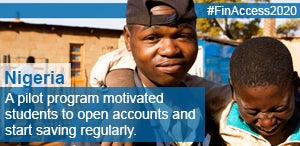 1. People could save more securely and conveniently.
1. People could save more securely and conveniently.
Putting away money for tough times is important for everyone, but especially for the poor whose financial lives can be unpredictable. Having access to a transaction account makes it easier to eat more and better foods, be more prepared for health crises, and, when savings starts during youth, develop good financial habits and get an education. With universal financial access, all people would be able to save even small amounts of money in a safe and secure way.
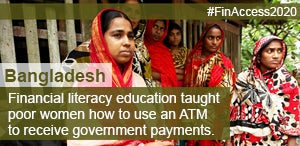 2. Poor people could more easily and safely receive government benefits.
2. Poor people could more easily and safely receive government benefits.
Globally, more and more governments are moving their social transfer programs – including pensions, aid, and social programs - from cash (or in-kind contributions) to electronic payments, which are safer and more convenient. Recipients often now receive the full benefits payment since intermediaries, who used to take a percentage of the money, have been cut from the process. However, there are obstacles related to the level of fees charged and the customer experience, which can be partly addressed through financial awareness and consumer protection.
 3. Entrepreneurs could get access to the financial services they need to build small businesses, and exposure to new markets.
3. Entrepreneurs could get access to the financial services they need to build small businesses, and exposure to new markets.
Currently 200 million micro, small and medium enterprises (MSME) can’t get sufficient financing to run their business. Transaction accounts can make data on entrepreneurs and businesses available, giving them a “digital footprint,” and help address the costs and risks associated with providing financial services to MSMEs. For example, including small firms in electronic value chains and e-commerce platforms, such as Alibaba in China and its Taobao platform, has opened up access to credit and payment services for 16 million vendor businesses, nearly 90% of whom are small or microenterprises.
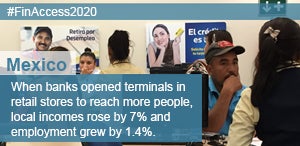 4. Inexperienced customers can be more empowered to use formal financial services.
4. Inexperienced customers can be more empowered to use formal financial services.
There are physical barriers and social barriers to financial access that transaction accounts can help overcome. Having a transaction account through a retail store or mobile phone can be less intimidating than entering a bank. Research in Mexico shows that financial staff may treat customers differently based on their appearance or financial knowledge. However, easy access to a transaction account should be coupled with financial awareness and education, and consumer protection to protect people from fraud, mis-selling and other market abuses.
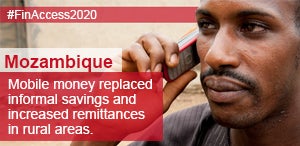 5. People in remote areas could tap into financial and other services with just a mobile phone.
5. People in remote areas could tap into financial and other services with just a mobile phone.
Since the 2007 launch of M-PESA in Kenya, 255 mobile money services have emerged around the world, offering services beyond sending payments and remittances. Mobile devices are being used to facilitate access to insurance, credit and savings, clean water, and solar energy. With universal financial access, the poor could do more with inexpensive feature phones.
Later this week during the World Bank-IMF 2015 Spring Meetings, Bank Group President Kim, Queen Máxima of the Netherlands, United Nations Secretary General’s Special Advocate for Inclusive Finance for Development (UNSGSA), United Nations Secretary-General Ban Ki-moon, heads of multilateral agencies, Central Bank Governors and private sector leaders from around the world will discuss the global progress toward universal financial access and the remaining barriers to achieving this goal by 2020. They will make ambitious new commitments to accelerate progress to reach the UFA 2020 goal.
The Universal Financial Access 2020 event will be livestreamed on April 17 in English, French, Spanish and Arabic.
Join us LIVE to hear these panelists discuss how to make the 2020 goal happen!
Or follow the event online with the hashtag: #FinAccess2020.
Also, you can submit your questions to the panelists ahead of the event or during the live webcast.
http://live.worldbank.org/universal-financial-access-2020

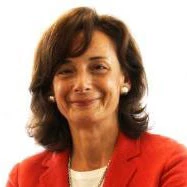
Join the Conversation